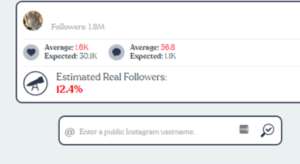4 Reasons You Need to Incorporate Artificial Intelligece into Your Next D2C Influencer Marketing Campaign

Influencer marketing is still big news in 2019.
According to TapInfluence and Nielsen, influencer-driven marketing content delivers a 11x higher ROI than traditional digital marketing approaches.
In addition, the global market spend on the influencer marketing industry is set to hit $5 -10 billion by the end of 2020.
Nowhere is the influencer’s reach more apparent than in the D2C market. A recent study by the Interactive Advertising Bureau (IAB), found that influencers had more sway among D2C shoppers than traditional brand shoppers.
42% of D2C shoppers expected to see their favorite brands partner with at least one professional influencer or celebrity. In contrast, only 19% of traditional brand shoppers had the same expectations of their go-to brands.
The far-reaching results of an influencer-centric marketing strategy can be seen with the likes of direct-to-consumer beauty business Glossier. Valued at $1.2B, Glossier has grown its beauty-empire from the grassroots up with an army of loyal micro-influencers.
However, in order to guarantee you see the results so many brands rave about when it comes to influencer marketing, you need to make sure your next campaign is backed by the right research and resources to help you meet your key performance indicators and avoid the most common pitfalls of influencer marketing initiatives.
The best way to do this? Artificial Intelligence (AI).
The realm of computer science where intelligent machines think and react in a similar way to humans, AI has become the backbone of thousands of successful influencer marketing campaigns.
But if you’re new to the world of AI and influencer partnerships, it can be difficult to know where to invest your marketing dollar. That’s why in this post, we’ve covered 4 of the best uses of AI in the influencer marketing space for D2C brands.
Let’s jump in.
H1 Find Your Ideal Influencer Match with Artificial Intelligence

One of the most powerful uses of AI is its ability to help you find the right influencer.
Without AI, marketing teams would have to spend hours sifting through, processing, and analyzing data on the performance of thousands of influencers to find the right fit for their brand – and relying on your team to connect with the right influencer can mean that important information can fall through the cracks. Many brands have been tripped up by a poorly-chosen partnership with a celebrity or influencer who was not a good match for their products or services.
Pewdiepie was recently called out by his followers for promoting an Honor View 10. Critics pointed out that the popular social media influencer regularly used an iPhone to post online – a fact that could have easily be picked up on with a speedy deep-dive into his Instagram content and the content of his followers using AI.
Thanks to its scalability, AI can help you search through millions of influencer accounts across the globe – allowing you to assess different markets and languages in a matter of seconds. The predictive analytics offered by AI platforms lets you effectively analyze months of data for leading influencers, across different social media networks. A manual search of influencer accounts is estimated to consume over 150,000 hours of manual labor every month. In comparison, AI can undertake the equivalent workload of 1,000 people.
As Tyler Folkman, head of AI at Branded Entertainment Network Tyler Folkman asserts, “A human can’t analyze the hundreds of millions of videos produced by the hundreds of thousands of influencers out there. But AI can. It will continue to learn to make better decisions with more data.”
H3 Gain Detailed Insights into Millions of Influencers with Unique AI Capabilities
Artificial Neural Networks (ANN) provide image recognition capabilities that allow you to analyze thousands of social media images and videos to source material that matches certain criteria. With ANN, you can uncover influencers using certain products, locations, or lifestyle choices across social media that fit your brand.
Image recognition can be coupled with Natural Language Processing (NLP), an AI analysis of language, to assess whether the content posted by an influencer is a good fit for you. If you’re looking to partner with a fun-loving extrovert, you can sift through social media to find influencers making use of emojis, posting updates with friends, and using more emotive language in their posts – all key indicators of extroversion online.

Screenshot from Microsoft Azure.
AI also offers a more in-depth personality classification with influencer analysis – which can assess the success of an influencer’s past campaign based on past engagement and growth, such as the number of ‘likes’ or conversions racked up by each post. As social proof is so key to the growth of D2C brands, a birds-eye view of such performance metrics can be invaluable for helping you to compare influencers and find the best fit for your brand.
H2 Optimize Your Influencer-Based Social Media Strategy with AI Analytics
Which posts perform best on Instagram? Are weekend posts outperforming weekday posts? Do video posts win more likes than images? AI can help you analyze post performance based on a range of metrics and compare these metrics with a deep dive into competitor post performance. From aggregate engagement to specific reach for target accounts – AI can highlight effective content strategies far more accurately than past methods using deep learning neural networks, as BEN’s head of execution and brand integration Jake Maughan highlights:
“Marketers used to rely on relationships with certain influencers and industry knowledge to plan a campaign. They would try to calculate KPIs, but it was very back-of-the-envelope math. With AI, we don’t have to do that. The AI combs through the data and identifies the content and influencers we need to align with to meet our KPIs—it’s automated and much more accurate.”
In comparison to other forms of basic or manual analysis, AI-based image recognition can uncover micro-elements within an image and assess their impact on follower engagement. For example, if an image is taken in a bar then these elements may include a host of different features, such as pop art, back-lighting, stools, bottles, and people of different demographics – among others. AI can be used to analyze how followers engage with each of these unique, granular elements.
Looking for AI-based analytics software for your next influencer campaign?
Use Quintly to analyze and track how well your posts are performing in comparison to your competitors’. Asses over 350 metrics, and gain access to broad overviews and in-depth analysis of post performance based on KPIs.
H2 Swerve Fraudulent Influencers and Damage to Your Brand with AI
According to David Yovanno, CEO of Marin Software, many social media users are sceptical of advertizing partnerships with influencers and are wary of inauthentic promotions. This lack of trust can alienate consumers and damage the reputation of your brand.
The demand for an authentic fit between brand and influencer is key for driving customer engagement. This is especially true for the D2C market, in which over 38% of D2C shoppers said that choice of influencer impacted their perceptions of a brand, compared to just 13% for traditional brand shoppers.
You also want to ensure your marketing budget is well spent: a recent report from Points North Group found that one company spent over $600,000 on influencer posts seen by fake followers.

Screenshot from Shane Barker + IG Audit.
Luckily, you can use AI to analyze how many genuine followers an influencer has – rather than bots or fake accounts. As David notes, “Artificial intelligence-powered discovery can help brands identify trustworthy talent that best fits their sensibilities.”
AI can also help you uncover which influencers are buying comments, likes, or followers – highlighting which social media ‘stars’ to avoid. For example, HypeFactory’s Auditor uses machine learning to discover behavior patterns that set apart fake accounts or bots from genuine users, and repackages this data into a succinct Audience Quality Score (AQS) for each influencer.
H2 Supercharge Your Influencer Marketing Campaigns with AI
Despite the remarkable ROI, the glittering world of influencer marketing is weighed down with misspent investments and influencer fraud. In the D2C market, where the authenticity and sway of the influencer is an ever-growing influence on consumers, AI can be a key tool to help you navigate this rapidly-growing space and ensure your marketing budget is well spent.